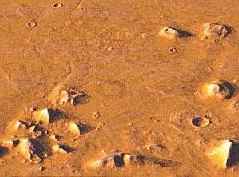Mars

Roman God of War
The links within this Alien Astronomer page will take you to an off-site destination in use as a resource for this subject. To return to this page, please click on your browser's back button.
Beautiful Color Photos and Summaries of Mars: Statistics
Mars:
All of Mars Mars' Moons:
Mars: Just The Facts
Mars: Just The Fiction
The Exploration of Mars
The Martian Spring
A Martian Autumn Begins
Mars: A Journey's End
If You Could Stand on Mars
The Search for Life on Mars
20 Years Ago: Vikings on Mars
Mars Pathfinder's Landing Site
Pathfinder On Mars
Mars Pathfinder Super Pan
A Presidential Panorama of Mars
A Landing On Mars
Sojourner On Mars
Mars Rocks, Sojourner Rolls
Utopia on Mars
The Sagan Memorial Station
Sol 4: Mars Color Panorama
Strange Rocks on Mars
Yogi Rock on Mars
Barnacle Bill And Sojourner
Half Dome Rock on Mars
A Rusty Sunset on Mars
A Martian Day's End
Surveyor At Mars
Mars: A Sheer Close Up
Haunting Mars
The Mountains of Mars
Olympus Mons: The Largest Volcano
Volcanos on Mars: Elysium Region
Mars: Ridges Near the South Pole
A Martian River Bed?
A Martian Lake Bed?
The Grand Canyon of Mars
In A Grand Canyon On Mars
Mars: A Canyon's Edge
Mars: Big Crater in Stereo
A Huge Impact Crater on Mars
Crater Shows Evidence of Dried Pond
The Weather on Mars
Clouds Over Tharsis on Mars
Ice Clouds over Mars
Mars: A Mist In Mariner Valley
Pictured: An Ancient Martian?
The Dunes Of Mars
At Work on Mars
Good Morning Mars
A Mars Glint
Mars: Looking For Viking
Mars: Cydonia Close Up
Return To Cydonia
A Face On Mars
Cydonia
Face and Nearby Objects on Mars
The "Face" on Mars is a rock formation on the surface of Mars resembling an enormous humanoid face staring straight up into space. It is about 2.5 km long x 2.0 km wide x 0.4 km tall and is located on a flat plain known as Cydonia Mensae in Mars' northern hemisphere (41 deg. N latitude 9.5 deg. longitude). The Face and other objects described on this page were imaged by one of the Viking Orbiters in the summer of 1976.
The Face was dismissed by scientists at the Jet Propulsion Laboratory as a trick of light and shadow and forgotten. The original image (Viking orbiter frame 35A72)
was rediscovered by Vincent DiPietro and Gregory Molenaar, two engineers at the Goddard Spaceflight Center, several years later. They also found a second image (70A13) containing the Face under slightly different illumination with the sun about 20 deg. higher in the sky.
City and Face:
The Face is not an isolated formation. About 20 kilometers west-southwest of the Face are several other unusual objects (dubbed the "City" by author Richard Hoagland). Where the Face is a rounded formation (geologists would call it a mesa or knob) the City contains an assortment of pyramidal objects with sharp angular sides.
Fortress:
Perhaps the most unusual object within the City is a pyramidal object (the "Fortress") that appears to have been stripped down almost to its base revealing an enclosed inner space. The perspective view (above right) was generated from the
overhead view (above left) using a single image shape-from-shading algorithm. Fine scale detail in the restored imagery includes a regular pattern of indentations along the lower wall of the structure and linear features on the terrain to the right.
D&M Pyramid:
About 20 kilometers south-southwest of the Face is a larger pyramidal structure first noticed by DiPietro and Molenaar. The D&M pyramid appears to have five sides. One of the sides is shadowed and two of the sides appear to be degraded.
The south face appears to be oriented almost exactly due south.
by Mark J. Carlotto ©
For More On Cydonia:
NASA's Cydonia Schedules
McDaniel Report On JPL Targeting of Cydonia
NASA's Cydonia Press Release
Preliminary Analysis of April 5 Cydonia Image
The City Square
Arcology Model Confirmed
Massive Tetrahedral Ruin
Eroding Ruins Like Berlin
NASA Rectified Face Image
The Face: Viking vs. MGS
The Face: Enhanced Images Comparison
Mars: Cydonia Close Up
Return To Cydonia
A Face On Mars
The Face on Mars

Since January 1, 2000